Refreshment Tour to Korea for Fukushima Children
A Tour of Hope for the Future
Refreshment Tour to Korea for Fukushima Children
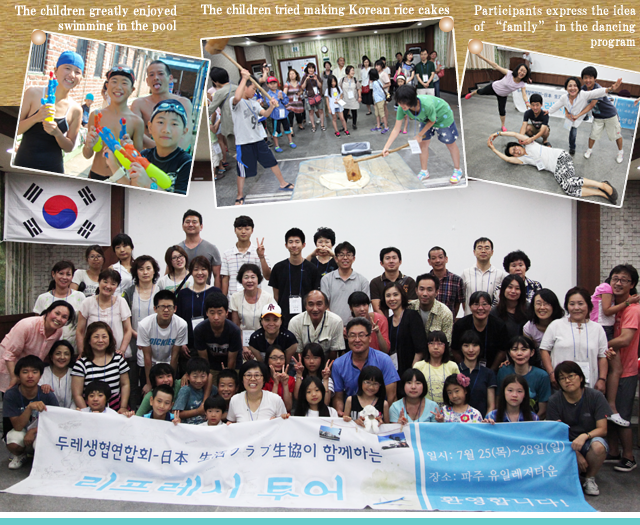
Since the devastating accident at Fukushima Daiichi Nuclear Power Station on March 11, 2011, we have always been under the threat of exposure to radiation in our daily life. Seikatsu Clubs in different parts of Japan organize refreshment tours every summer for the children of Fukushima, inviting them to prefectures distant from Fukushima, in the hope that the children will be able to play outdoors without any of the restraints they face at home. This summer, Dure Consumers’ Co-operative Union (DCCU) in Korea helped the Seikatsu Club Consumers’ Co-operative Union (SCCCU) co-organize a refreshment tour to Korea. (Posted on August 28)
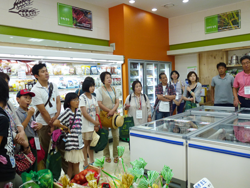 DCCU was launched in 1997 and has expanded its activities in the suburbs of the Seoul metropolitan area. “Dure” is an indigenous Korean word meaning "cooperation" . The union promotes organic farming through buying domestically grown fruits and vegetables, and nurtures the culture of cooperation in daily life. Currently, around 150,000 members purchase the co-op’s original brand of food and housewares called "living materials". Some of the member co-operatives of SCCCU and DCCU have been holding interchanges through sister partnerships. Seven out of 27 member co-operatives of Dure Consumers’ Co-operative Union took part in the tour. They prepared for the tour by carrying out such activities as planning for the program and preliminary examinations of the venues.
DCCU was launched in 1997 and has expanded its activities in the suburbs of the Seoul metropolitan area. “Dure” is an indigenous Korean word meaning "cooperation" . The union promotes organic farming through buying domestically grown fruits and vegetables, and nurtures the culture of cooperation in daily life. Currently, around 150,000 members purchase the co-op’s original brand of food and housewares called "living materials". Some of the member co-operatives of SCCCU and DCCU have been holding interchanges through sister partnerships. Seven out of 27 member co-operatives of Dure Consumers’ Co-operative Union took part in the tour. They prepared for the tour by carrying out such activities as planning for the program and preliminary examinations of the venues.
This was the first refreshment tour abroad, and 24 people from nine families participated. Everyone gathered nervously at Sendai Airport before boarding the flight to Korea. They felt relieved when they were welcomed at Incheon Airport by the smiling faces of the hosts, including their leader Mr. Oh Seung Hyun, Executive Director of Barun Consumers’ Co-operative. They boarded a reserved coach, made a brief stop at a Dure Consumers’ Co-operative shop, and arrived at Youeal Leisure Town in Paju City, where the welcome ceremony was held. They were welcomed by a total of 40 people—family members of the ten host families, with whom they would spend three nights and four days, and staff members of the Korean Co-operative.
Soon the welcome party started and the Korean group played the ocarina. Korean children sang the Japanese version of "If You're Happy and You Know It" and "Under the Spreading Chestnut Tree.” The Japanese group practiced singing the Korean version of "Twinkle, Twinkle, Little Star" on the coach and sang the song at the party both in Japanese and Korean, which led to a big chorus at the end. The children from Fukushima were not used to the hot Korean food and seemed a little overwhelmed by their welcome on the first day.
The ice was suddenly broken on the second day. While their parents joined a networking event, children went to a swimming pool. It was a hot day and the children were so eager that they jumped straight into the pool. The Korean children did not worry about the language barrier and went to the Japanese children, saying, "Let's play together.” While they chased each other in the water, older children naturally came to take care of the younger children. They played tag and other games and became friends.
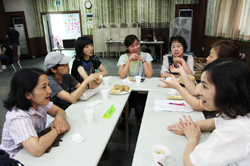 Their parents had a networking session for Korean and Japanese co-operatives. The Korean "Eco Consumer's Co-operative" gave a presentation about their no-nuke activities. The head of the Japanese group, Ms. Miyoshi Yokoyama from Shinchi Town, talked about the outline of the Seikatsu Club Fukushima and the situation after the earthquake. Then they split up into interest groups such as food, childcare, the environment and paternity, where they talked to each other through interpreters.
Their parents had a networking session for Korean and Japanese co-operatives. The Korean "Eco Consumer's Co-operative" gave a presentation about their no-nuke activities. The head of the Japanese group, Ms. Miyoshi Yokoyama from Shinchi Town, talked about the outline of the Seikatsu Club Fukushima and the situation after the earthquake. Then they split up into interest groups such as food, childcare, the environment and paternity, where they talked to each other through interpreters.
On the second and third days, they experienced a variety of programs such as drumming, dancing, making rice cakes, trekking, traditional Korean knotting, and an outdoor gesture game. Every part of the program was designed to enable people to learn about Korean culture and enjoy physical activities. In many of the activities, Japanese and Korean families worked together in pairs and became as friendly as a family.
On the last day, the adults were all surprised when the children, no matter whether younger or older, Korean or Japanese, started to play a statues game (a game the Korean children call "Rose of Sharon has bloomed "). They overcame the cultural and language barriers. People felt seeds of hope when they saw the children trying to understand each other with their hearts through physical contact.
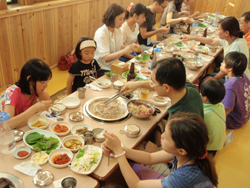 "At the welcome party on the first day, Japanese families and Korean families sat at different tables, but today they mingled at the dinner tables,” Ms. Lee Keum-Ja, President of Dure Consumers’ Co-operative Union looked back on the three nights and four days. “We can't distinguish between Korean children and Japanese children from their appearance. This refreshment tour was the first one of this kind. It was held in a cooperative way and was very heartwarming. By organizing the tour, I realized that the important thing is heart, not language."
"At the welcome party on the first day, Japanese families and Korean families sat at different tables, but today they mingled at the dinner tables,” Ms. Lee Keum-Ja, President of Dure Consumers’ Co-operative Union looked back on the three nights and four days. “We can't distinguish between Korean children and Japanese children from their appearance. This refreshment tour was the first one of this kind. It was held in a cooperative way and was very heartwarming. By organizing the tour, I realized that the important thing is heart, not language."
At the end of the tour, the Korean host families gave presents to the Japanese families. Even after the meeting, the children did not want to leave their Korean friends. They gave their belongings to the Korean children as presents and exchanged their postal addresses. It was impressive to see them snuggle up to the friends they were reluctant to leave.
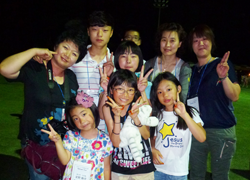 It is true that there was a serious language barrier, and some people became frustrated when they could not communicate their feelings. The barrier was removed because the Korean people were very kind and tried their best to communicate together by struggling to speak rudimentary Japanese or by using gestures. Many Japanese people who joined the tour said "The Korean people worked very hard to learn the Japanese language this time. We want to come back again after learning the Korean language.”
It is true that there was a serious language barrier, and some people became frustrated when they could not communicate their feelings. The barrier was removed because the Korean people were very kind and tried their best to communicate together by struggling to speak rudimentary Japanese or by using gestures. Many Japanese people who joined the tour said "The Korean people worked very hard to learn the Japanese language this time. We want to come back again after learning the Korean language.”
While we are now experiencing a Korean culture boom in Japan, Japan and Korea have a sad history that we should not forget. Some people turn their eyes from domestic problems and provoke anger toward neighboring countries. Under these circumstances, this refreshment tour was a hopeful encounter for the future in which people from two countries separated by the sea will work together for a peaceful world and a nuclear-free East Asia.
生活クラブをはじめませんか?
42万人が選ぶ安心食材の宅配生協です
ウェブ加入限定 無料プレゼント






